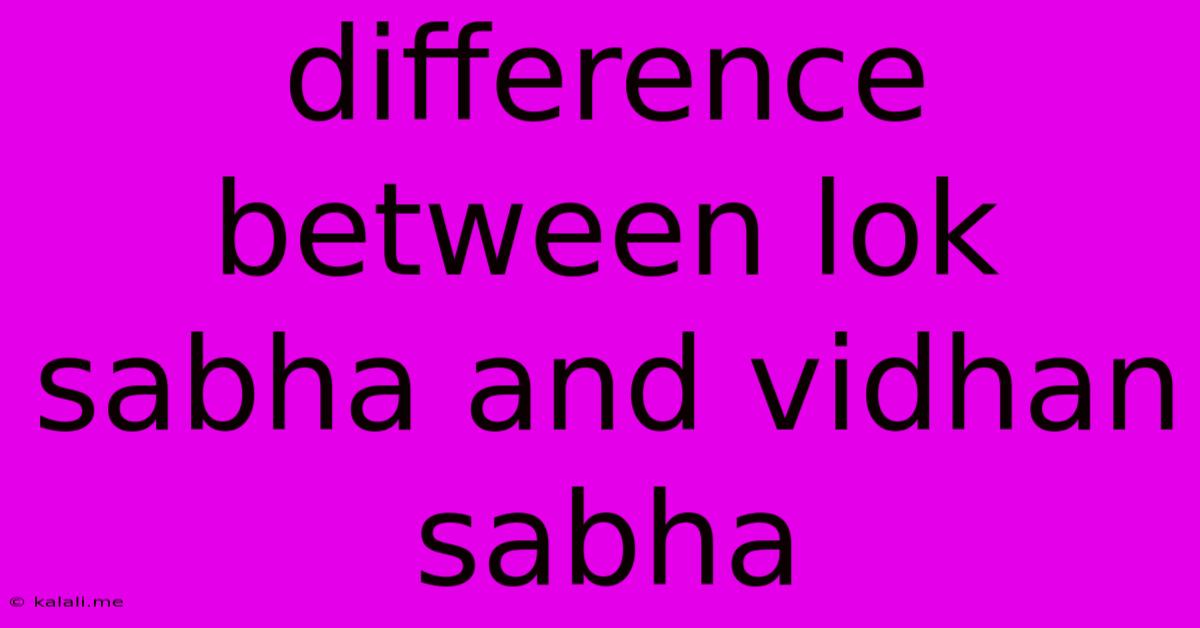Difference Between Lok Sabha And Vidhan Sabha
Kalali
Jun 13, 2025 · 3 min read

Table of Contents
Lok Sabha vs. Vidhan Sabha: Understanding India's Parliamentary Structure
India's parliamentary democracy operates on a bicameral system at the national level and a unicameral system at the state level. This means there are two houses of parliament at the national level, and one house at the state level. Understanding the key differences between the Lok Sabha and the Vidhan Sabha is crucial to grasping the nuances of Indian governance. This article delves into the distinctions between these two vital legislative bodies.
This article will explore the key differences between the Lok Sabha (the lower house of the Indian Parliament) and the Vidhan Sabha (the state legislative assembly), covering their composition, powers, and functions.
Composition and Representation: A Key Difference
The most fundamental difference lies in their composition and the constituencies they represent.
-
Lok Sabha: The Lok Sabha, also known as the House of the People, represents the entire nation. Its members, known as Members of Parliament (MPs), are directly elected by the people of India through adult suffrage based on geographically defined constituencies. The number of MPs varies, with a maximum limit set by the Constitution. The Lok Sabha currently has 543 elected members.
-
Vidhan Sabha: The Vidhan Sabha, or state legislative assembly, represents a specific Indian state. Its members, known as Members of the Legislative Assembly (MLAs), are directly elected by the people of that state. The number of MLAs in each Vidhan Sabha varies depending on the state's population.
Powers and Functions: Legislative Authority and Beyond
While both bodies possess legislative powers, their spheres of influence differ significantly.
-
Lok Sabha: The Lok Sabha holds greater power than the Rajya Sabha (upper house of the Parliament) in financial matters. Any money bill must originate in the Lok Sabha. It also plays a crucial role in the formation and dismissal of the government. The Lok Sabha holds the power to initiate and pass legislation related to matters listed in the Union List (national-level subjects) of the Seventh Schedule of the Indian Constitution.
-
Vidhan Sabha: The Vidhan Sabha is the primary legislative body for its respective state. It has the power to make laws on subjects listed in the State List (state-level subjects) of the Seventh Schedule. The Vidhan Sabha also plays a vital role in the state's governance, approving the state budget, and overseeing the work of the state government.
Term and Dissolution: Duration of Service
-
Lok Sabha: The Lok Sabha has a maximum term of five years, although it can be dissolved earlier by the President on the advice of the Prime Minister.
-
Vidhan Sabha: Similar to the Lok Sabha, the Vidhan Sabha also has a maximum term of five years but can be dissolved earlier by the Governor on the advice of the Chief Minister.
Leadership and Executive Control
-
Lok Sabha: The Lok Sabha elects its Speaker, who presides over its sessions. The government, headed by the Prime Minister, is responsible to the Lok Sabha. A vote of no confidence passed by the Lok Sabha can lead to the downfall of the government.
-
Vidhan Sabha: The Vidhan Sabha also elects its Speaker. The state government, headed by the Chief Minister, is responsible to the Vidhan Sabha. A vote of no confidence here would lead to the fall of the state government.
In Summary: Key Differences at a Glance
| Feature | Lok Sabha | Vidhan Sabha |
|---|---|---|
| Representation | Entire Nation | Specific State |
| Members | Members of Parliament (MPs) | Members of Legislative Assembly (MLAs) |
| Legislative Power | National level subjects (Union List) | State level subjects (State List) |
| Financial Powers | Primary authority on money bills | Secondary role in state finances |
| Executive Control | Holds the Prime Minister accountable | Holds the Chief Minister accountable |
Understanding the differences between the Lok Sabha and Vidhan Sabha is essential for anyone seeking to comprehend the workings of India's complex yet vibrant democracy. Both play vital roles in shaping the nation and its individual states, ensuring a balanced distribution of power and representation.
Latest Posts
Latest Posts
-
A Graphics Tablet Is Also Called A Digitizing Tablet
Jun 14, 2025
-
The Cognitive Domain Involves Learning Through
Jun 14, 2025
-
Classical And Operant Conditioning Are Forms Of
Jun 14, 2025
-
What Is Not Found In Animal Cells
Jun 14, 2025
-
Which Of The Following Is Not A Desktop Application
Jun 14, 2025
Related Post
Thank you for visiting our website which covers about Difference Between Lok Sabha And Vidhan Sabha . We hope the information provided has been useful to you. Feel free to contact us if you have any questions or need further assistance. See you next time and don't miss to bookmark.